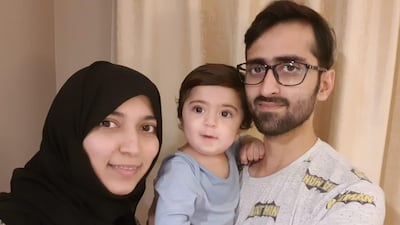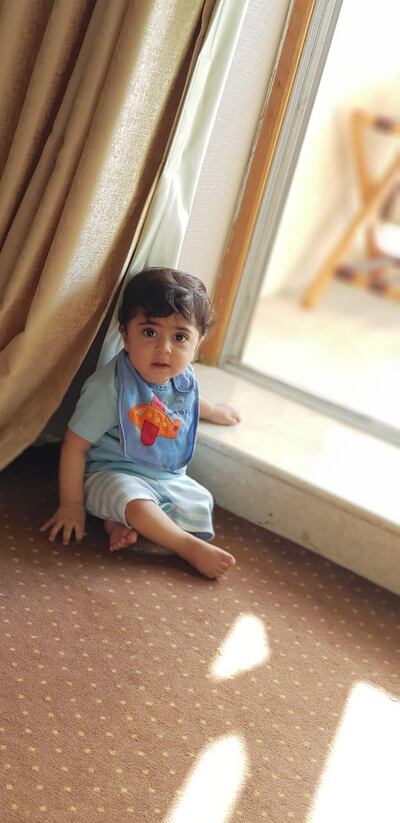The mother of a 10-month-old boy diagnosed with Covid-19 has told of her relief after he was given the all-clear.
Maryam Fazal, 27, her husband Raheel and son Mohammed were confirmed to have the virus last month.
They spent two weeks in isolation at a Sharjah hotel set aside for patients.
After 11 days of vomiting, stomach ache, chest congestion and coughing, Mohammed had his second negative result on April 24, meaning that he was no longer infected.
"It's a big relief that he's recovered," Ms Fazal, from Pakistan, told The National.
“He has been in a very bad situation. He had constipation for a week and he was in very bad pain. The other night he was crying a lot. Also, while taking the swab test he was crying, was rubbing his nose and crying most of the night.”
The only medication given to Mohammed was cough and dehydration syrup.
Ms Fazal’s entire household tested positive for the virus.
Her brother was first to become ill, then his wife and their two children, followed by Ms Fazal, her husband and then Mohammed – who all live under the same roof in a four-bedroom house.
As of May 2, there were 13,038 cases in the UAE, 2,543 have recovered and the death toll stands at 111.
Isolation facilities across the country, including in government-approved hotels, have been made available to accommodate the rising number of patients with mild symptoms or who are asymptomatic. Ms Fazal and her husband and son shared a room at the Hotel Holiday International in Sharjah.
The couple have received their first negative result, but cannot leave the hotel until the second is negative.
“I was really worried because he’s such a small baby. I couldn’t even tell when and if he was pain until he cried,” she said.
“I was also scared thinking if his recovery takes a long period of time. I’m a first time mother and this was a horrifying experience for me. I was panicking and heartbroken over the fact that a baby could suffer through this.”
Because Mohammed recovered before his parents, Ms Fazal has been worried about if he can get re-infected with the virus as they are all living together in isolation.
She has worn a mask throughout the day and has been sanitising the room every two hours as a precaution.
There have been reports of patients abroad that have been re-infected, though findings remain inconclusive.
In some viral diseases, such as measles, the antibodies created to fight the infection last for the rest of the patient's life.
But coronaviruses are known to be a potential exception and no one knows how long antibodies against the Covid-19 virus remain effective.
Ms Fazal said she was concerned that Mohammed appeared to have developed allergies in the past week.
“All of the sudden he is allergic to blueberries and his cheeks turned bright red the other day. We’ll have to be more careful about what we are feeding him from now on," she said.

Dr Shahid Gauhar, a specialist neonatologist at Dubai's Prime Hospital, which has half of its rooms set up to treat Covid-19 patients, said it was "too early" to say if the virus could affect the immunity of children in the long run.
“Not a single case has been followed up for more than five or six months, so you can’t say what kind of impact it could have,” he said.
“But it does act like a virus. At the time of infection, the immunity goes down and the baby gets sick.”
He said the number of infected children was “far less” than adults.
To date, Dr Gauhar had seen three cases at his hospital in which parents have infected their young children.



